[page] 95
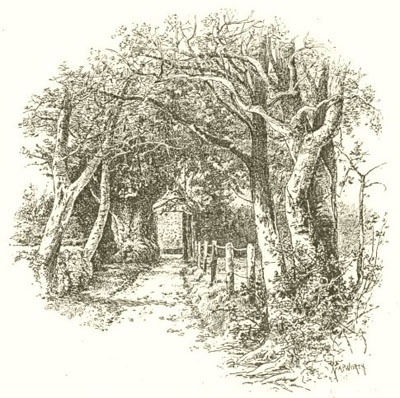
summer-house at south and of the "Sand-walk."
THE HOME OF A NATURALIST.
BY THE REV. O: J. VIGNOLES, M.A.
"IT is not every one's lot to get to Corinth,"*so the Roman poet tells us; and no wonder, for the journey from Brundusium to Greece was encompassed with many difficulties to the ancient voyager. Horace had proved the perils of "Adria," and there are numberless allusions in the great writer's poems to its unexpected mutations of temper, and the frequency of its dark skies, its angry billows, and its ruthless winds.
In visiting the home of the great naturalist of this century there are no such perils of the deep, and yet it is by no means easy to get at that sequestered spot on the backbone of the chalk escarpment of Mid Kent, which has now become classic ground as the scene of those meditations and experiments and profound generalisations which have built up the imperishable fame of Charles Darwin— monumentum œre perennius. It is close upon four miles from Orpington on the South-Eastern Railway, and the visitor must walk the whole way, unless he is so fortunate as to find a carriage waiting at the station to carry its owner to Down, and to be courteously invited to take the only spare seat; but this was a piece of unexpected good luck which fell to the writer's lot, as the home of the gentleman to whom I refer was close to Mrs. Darwin's residence. For a Londoner the only other way of reaching Down is from Hayes, where a carriage may be ordered beforehand; or, if the visitor is equal to it, there lies a glorious walk of five miles before him, over the "Blackheath pebble beds" which form the tertiary outlier of Hayes and Keston Commons; and then on through the delightful park of Holwood, now belonging to the Earl of Derby, but which a century ago was the property of the great
*"Non cuivis homini contingit adirc Corinthum."
[page] 96
statesman William Pitt, and was his favourite retreat from the strife of controversy and the cares of State.
As is well known, Charles Darwin could not endure a town life, for which his tastes, his habits, and, above all, his health unfitted him. Social meetings (he tells us) always at the time gave a fillip to his spirit, but the excitement was invariably followed by painful physical and mental prostration. Thus it happened that he was driven into the country, and (to use his own words) "after a long and fruitless search in Surrey and elsewhere, at last found this house (at Down) and purchased it—pleased with the extreme quietness and rusticity of the place." This was in September, 1842, and here the great philosopher was permitted to live and labour for nearly forty years; or, as he modestly puts it, "my chief enjoyment and sole employment through life has been scientific work."
It was in the pursuit of scientific relaxation that a party of geologists found their way by road and rail, by carriage or on foot, to this remote but pleasing retreat on the 18th June, 1892; an appropriate day, for we know "peace hath her victories no less renowned than war," and beyond controversy Charles Darwin has climbed to as secure a footing on the platform of fame by his scientific achievements as did the immortal "Duke" by his skill and daring and patient endurance on the field of battle. Our leaders on the occasion were Messrs. Whitaker and Leighton, together with an amateur geologist and explorer, whose contributions to our acquaintance with pre-historic man by his discovery of palæoliths
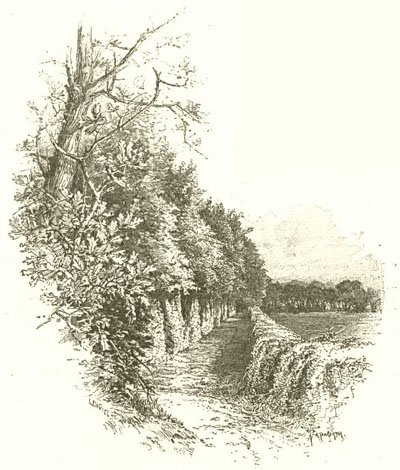
The "Sand-walk."
[page] 97
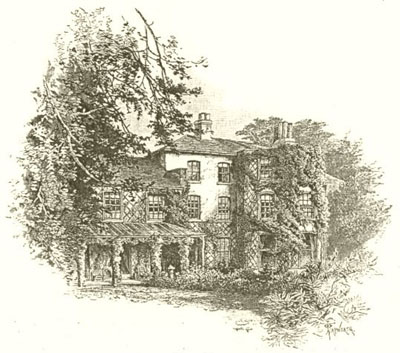
Down House—south side. View from the garden.
on the chalk hills of Mid Kent have been gratefully acknowledged by the leaders of geological inquiry.*
By the peculiarities of the South-Eastern train service, and by the unexpected kindness of the resident already referred to, I found myself at Down fully two hours earlier than the other members of our little congress; and here was a delightful opportunity of quiet hero-worship, "far from the madding crowd," in the silent solitary shrine consecrated by the genius, and still (as it were) haunted by the spirit of one of the noblest and yet humblest of the high priests of inductive science. No member of the Darwin family was in the house, but I was bidden a kind welcome by a courteous lady who had long been a member of the household, and had often read to Mr. Darwin from some favourite novel in the half hours of intermission of his daily toil. My guide took me into the garden, and we held a brief converse on the characteristics of the great man, from whom she "had received," as she said, "more truly religious lessons than (glancing at my white tie) from any minister of the Church of England." I quite assented, and assured her of my admiration for those qualities which in him were so conspicuous, but in most of us—lay or clerical—so rare: sound judgment, unwearied industry, absence of prejudice, a passionate love of truth, and withal abounding charity, all different aspects of real religion; to which the lady simply answered, "Yes, and humility." Her words made me think of parts of his autobiography where it is evident that Darwin then retained reverence for revealed religion, e.g. in his notes on visiting some of the Pacific isles on his voyage in the Beagle. "It is admirable to behold what the missionaries have effected both here, and in New Zealand. I firmly believe they are good men, working for a good cause." And in a letter he remarks: "The impossibility of conceiving that this grand and wondrous universe, with our conscious selves, arose through chance, seems to me the chief argument for the existence of God. … I have always considered that the theory of evolution is quite compatible with that belief."—"Darwin's Life," vol. i., pp.
*Mr. De Barri Crawshay, of Sevenoaks.
[page] 98
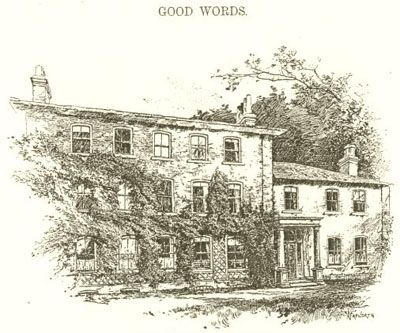
Front of Darwin's house at Down.
306, 307. I made no further remark, however, to my companion, but recalled that marked exemplification of this virtue of humility given in his "Autobiography," when, on receiving from the Malay peninsula in July, 1858, A. R. Wallace's "Essay on the Tendency of Varieties to depart indefinitely from their Original Type," Darwin at once determined to do nothing more with his own manuscript notes on the "Origin of Species," saying that Wallace had independently worked out the same views, "but had expressed them much better." It was with difficulty Lyell persuaded him to read an abstract of his own work on the same evening that he communicated Wallace's Essay to the members of the Linnæan Society.
What thoughts of the immortal "Origin" thronged within me as I stood alone in the very penetralia of its birthplace, the larger of the two studies which were his workshop, and gazed on that admirable photograph of the author—taken at the time or shortly before the publication of his book—which is reproduced as a frontispiece to the first volume of his "Life"! What a grand expanse of brow, what serious purpose in the steadfast face, what intelligence and transparent truthfulness in the expressive eyes, what simplicity and benevolence in the open countenance! And this was the spot where the great investigator sat down, on the very morning after the reading of those two memorable papers, to compose his "Principia"—as the book might well be called— of the system of organic life on our earth, as the mighty Newton had done nigh two centuries earlier for the mechanism of the heavens. In this room Darwin began the final arrangement and condensation of those piles of manuscript which contained the researches and observations on which he had laboured at intervals for twenty-one years, and (as he has told us) he wrote continuously and with intense application "for one year and ten days"; and the fruit of this travail was the completion of the "Origin of Species" in the late summer, and its publication and triumphant reception by the world in the November of 1859.
Remembering the philosopher's habits, I looked closely at the bookshelves in this room, but the collection was somewhat miscellaneous. Amongst them, however, as I expected, was a goodly array of novels; but the volumes had evidently been bought for reading, not for show. No stately phalanx of Scott's or James', or Bulwer Lytton's romances, with costly bindings and richly gilt backs, such as one often sees in the well-ordered library of a town or country mansion; but the volumes were mostly "yellow-backs," many of them belonging rather to the category of the "intense" than to the
[page] 99
"inspired," and in every case giving evidence of being procured to be thumbed and read and put away, all packed together on the plainest and homeliest of bookshelves, without nail-studded leather fringe below or green baize edging above. There they were clustered, without formal array or order, Dickens', Marryat's Yonge's Oliphant's, Lever's, Braddon's et hoc genus omne. Each had served its turn, had ministered to the dulce desipere of the great thinker, or contributed its harmless opiate to his tired mind; had evoked the quiet laugh, or unlocked the too-little used chambers of imagery, or, it may be, demanded from that childlike nature a tribute drawn from the "sacred source of sympathetic tears."
It was a pleasure to find this motley collection undispersed; but not all the books were novels. Others I saw which suggested that Mr. Darwin's sons, now grown to man's estate, walking in their father's footsteps, and even augmenting his fame, had laughed and cried over childish tales of tender pity and boyish heroism. Moreover, I espied two books of a religious character, side by side, both expressive of the breadth of mind, the freedom from effete conventionality, and the presence of a true devotional spirit, which are now the distinguishing characteristics of the liberal school of theology. The two books were the sermons of F. W. Robertson and of Bishop Colenso. Five-and-thirty years ago the writings of the one were hardly rated as orthodox, whilst those of the other were branded as the most pernicious heresy; and doubtless that same estimate still holds with the small remnant of what was once a great party, with whom one particular method of interpreting Christian doctrine is the only safe path to Heaven, and who "hate with a perfect hatred" the whole apparatus of textual and historic criticism which has riven the fetters of Biblical study, and drawn into the ranks of sacred scholarship some of the loftiest and most devout intellects of the present generation.
Perhaps if I had ventured on a closer scrutiny I might have discovered the copy of Paley's "Evidences" and of his "Natural Theology," both of which works Darwin regarded as models of close and conclusive reasoning, "the premises" (as he says) "being granted;" and he always, and rightly, valued at the highest rate the exquisite clearness and perspicuity of the writer's style.
But—whether for good or ill—"Evolution" has so largely remodelled our interpretation of "Nature," and possibly is doing the same with many of our conceptions of Chris-
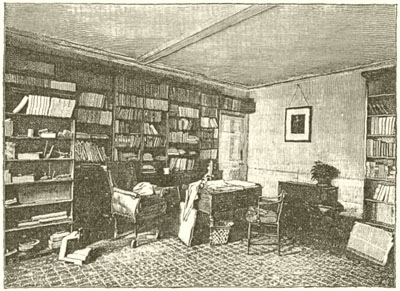
Darwin's Study.
[page] 100
tianity, that the old methods of reasoning upon phenomena—mental and physical, sensuous and supersensuous—have very little dialectic efficacy on the modern intellect, and have become practically obsolete.
In the midst of my cogitations the visiting party arrived, headed by our courteous host, Mr. William Darwin, who had come from Southampton expressly to meet them, as his mother (the owner of the house) could not be present. Of this venerable lady I may say in passing that she is in the full possession of all her faculties, and is still blessed with excellent health. How much is owing to her for the scrupulous and reverent care that preserves undisturbed the many touching memorials of her husband's personality and work, in the spot now consecrated by the remembrance of his life and labours!
Mr. W. Darwin pointed out in the smaller study many impressive relics of his father; his favourite chair, the table at which he wrote, the microscope which he used so constantly in his physiological and anatomical researches; and on this table were numerous sheets of his MS. notes, and, above all, the last pages which he had penned before death put an end to his toil and called him to his well-earned rest.
In the drawing-room, on a side-table, there was laid open for our inspection the large handsomely-bound album, which was presented to the distinguished English student of science by all the great naturalists belonging to the German, French, Austrian, Danish, and other foreign Universities. Their names are legion, and their photographs number several hundreds, and completely fill the volume. On the dedication page is an inscription in richly-illuminated letters:—
"DEM
CHARLES DARWIN
Reformator der Natur-geschichte."
Underneath many of the portraits were written the individual's name and title, but by far the majority were left without such indication. If a stranger might venture on a suggestion, it would largely add to the interest of this heirloom and to the intrinsic value of the album if the needful information were given in every case.
For another reason I was glad I arrived early at Down, for I thus was able to spend a whole hour entirely in solitary meditation, loitering along Darwin's own particular walk, his favourite, and, I believe, his only place of exercise; a beaten path extending along three sides of a small wood, measuring in all about one-third of a mile, and bearing the name of the "Sand-walk." In this sequestered spot the great philosopher on every fine day took his "constitutional," if such a word of mundane association, so suggestive of one's own too often vacuous and listless promenade, can be applied to the self-communing sage whose presence seems still to hover round this lonely spot. We can picture him as he paced the narrow footway, or rested awhile on the rustic seats over-shadowed by thick shrubs, pondering long and painfully on the complex and far-reaching results of his great central generalisation, the "Origin of Species" in the world of organic nature. That the writer of this article is not giving the reins to his own undisciplined fancy is shown by the simple incident, related by Darwin himself, of his noting "the very spot on the high road over which the carriage was passing" when the idea of variation of species by migration and change of local condition first occurred to him. We can conceive how slowly but surely the ultimate issues of that grand but simple hypothesis thronged upon his mental gaze, and how a calm confidence in the invincible truth of Evolution gradually but firmly established itself in his mind. Humble as he was, the prospect must have filled his soul with glowing expectations, not of human applause or of the rewards that fall to the statesman, the senator, or the speculator; but of the calm triumph of truth over error, of light over darkness, of the symmetry and simplicity of natural law over the confusion and caprice that marked the artificial hypotheses of prejudice and ignorance.
Yet we must never forget that (to use Professor Tyndall's words) Evolution neither solves nor professes to solve the ultimate mystery of this universe. Or, as the late Aubrey Moore said: "Evolution has done nothing to explain creation." The problem of Archebiosis still remains unsolved; and we may do worse than fall back on the suggestion of one of the greatest Fathers of the Church, when he says, in commenting on Genesis: "God at first created many germs which should afterwards develope according to their own laws."
In the garden through which a visitor must pass to reach the "Sand-walk" there are seen the beds, diverted once more to the cultivation of homely vegetables, and unconscious of the higher uses to which they were once dedicated by the great experimentalist, where he sowed different kinds of grass seed, and
[page] 101
counted each individual stem as it grew, in order to observe or discover the traces of cross-fertilisation, or the tendency of any species to variation. And it was in the neighbouring meadow that he laid down the chalk, the gradual subsidence of which was to mark the rate of deposition of the mould above it by the operation of earth worms.
At the eastern extremity of the outbuildings were the dove-cots, the home of birds now immortalised in the prosaic records of science, in which were reared the varieties of breeds and cross-breeds of countless families of pigeons; and the results of these patient and long-continued experiments became —as we all know—a very important factor in the practical confirmation of the theory of Evolution. Here (as Dr. E. Ray Lankester has put it) was proved the possibility of "balance." or "elaboration," or "degeneration," in the genus Columbœ.
The ingenuity of the philosopher discerns the direction of Nature's laws towards improvement or deterioration in organized beings, according to the more or less favourable condition of their environment. Care, nurture, and felicitous combinations produce variety and beauty of form and colour, and a continual tendency to advance in the scale of natural endowment. And the converse is equally true; a colony of pigeons in some far off island, isolated from the haunts of civilised man, would be compelled by the operation of law to revert slowly to some lower and more primitive type; discarding the badges of a higher culture, losing by degrees the marks of grace and beauty once attained to, and conforming to the ruder image and the less perfect structure of the past. And the lesson runs into deeper ground than this, for as domesticated animals gradually lose their higher qualities if they chance to be driven again into a wild condition, so does man deteriorate, both in body and mind, by any reversion to savagery in social or civil or domestic life. By neglecting physical requirements his body must degenerate; and by disregarding the mental and spiritual culture of his higher nature, his moral character may become debased by lawlessness and vice, and his soul be atrophied by disobedience to the demands of conscience and religion.
The visitors to Down House were now dispersed over the grounds, having enjoyed with evident relish—after their long pedestrian excursion over the chalk plateau—the bountiful refreshments so liberally laid out for them by order of Mrs. Darwin. The lawns are spacious and beautifully kept, and there was a profusion of flowers on all sides, and some magnificent trees and shrubs, which, on the south-east side, had formed leafy alleys, affording delightful strolls to the urban visitors, and providing a shady retreat, here and there, for the contemplative, in which to dwell on some of the many problems of natural existence, of mental and material life in man and beast, which the works of the great Kentish philosopher are continually bringing before us.
How to discern between the "knowable" and the "unknowable"; how to combine the assured prevalence of inviolable natural law with the undeniable claims and instinctive convictions of moral right and wrong, and, above all, with the secret whisperings of the hope of immortality hereafter, must ever provide the thoughtful mind with the gravest and most momentous cogitations.
Yet, as full of such "obstinate questionings" we move homeward, perhaps, in more senses than one, the answer may be found nearer than we supposed: Solvitur ambulando.
And now, at the close of the record of this memorable day, I think I cannot do better than conclude with the lines of Burns:—
"But how my subject theme may gang,
Let time and chance determine;
Perhaps it may turn out a sang,
Perhaps—turn out a sermon."
Our illustrations are executed from photographs taken by C. Essenhigh Corke, Sevenoaks, by kind permission of Mrs. Darwin.
